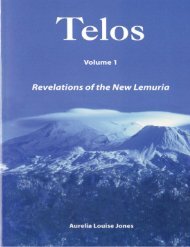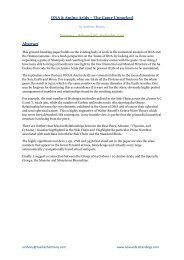clifford_a-_pickover_surfing_through_hyperspacebookfi-org
clifford_a-_pickover_surfing_through_hyperspacebookfi-org
clifford_a-_pickover_surfing_through_hyperspacebookfi-org
You also want an ePaper? Increase the reach of your titles
YUMPU automatically turns print PDFs into web optimized ePapers that Google loves.
CONCLUDING REMARKS 167<br />
swered. I hope that an analogous situation exists in the physical world.<br />
If my view of the future is correct, it means that the world of physics<br />
and astronomy is also inexhaustible; no matter how far we go into the<br />
future, there will always be new things happening, new information<br />
coming in, new worlds to explore, a constantly expanding domain of<br />
life, consciousness, and memory.<br />
Let's end this book at a point from where we started. Throughout, I have<br />
referred to clergyman Edwin Abbott Abbott's 2-D world called Flatland. The<br />
book describing it is both scientific and mystical. I wonder if Abbott actually<br />
thought that the fourth dimension was the key to understanding God. I am<br />
doubtful. In his book The Spirit on the Waters, written nearly ten years after<br />
Flatland, Abbott recounts Flatland's climactic scene in which the 2-D hero is<br />
confronted by the changing shapes of a 3-D being as it passes <strong>through</strong> Flatland.<br />
The Flatlander does not worship this being because of its God-like powers.<br />
Rather, Abbott suggests that miraculous powers do not necessarily signify<br />
any of the moral and spiritual qualities required for worship and adoration.<br />
Abbott concludes:<br />
This illustration from four dimensions, suggesting other illustrations<br />
derivable from mathematics, may serve a double purpose in our present<br />
investigation. On the one hand it may lead us to vaster views of<br />
possible circumstances and existence; on the other hand it may teach<br />
us that the conception of such possibilities cannot, by any direct path,<br />
bring us closer to God. Mathematics may help us to measure and<br />
weigh the planets, to discover the materials of which they are composed,<br />
to extract light and warmth from the motion of water and to<br />
dominate the material universe; but even if by these means we could<br />
mount up to Mars or hold converse with the inhabitants of Jupiter or<br />
Saturn, we should be no nearer to the divine throne, except so far as<br />
these new experiences might develop in our modesty, respect for facts,<br />
a deeper reverence for order and harmony, and a mind more open to<br />
new observations and to fresh inferences from old truths.<br />
Abbott believed that study of the fourth dimension is important in expanding<br />
our imagination, increasing our reverence for the Universe, and increasing<br />
our humility—perhaps the first steps in any attempt to understand the mind<br />
of God.







